Author bios are one of the most overlooked tools in marketing: they can add credibility, make the rest of your content more effective, and even get you conversions.
As the founder of a data-driven content marketing agency, Grow Atom, I see data on results-based content marketing every day. I've seen what works—and what doesn't. So I know that, with a few adjustments, you can write a results-driven bio that brings in more leads, demo signups, visits, likes, sales, or whatever your biggest metric is.
Here I'll share a simple three-step formula for bios that I follow, along with great example bios from my swipe file. And I'll wrap up with an easy template you can use for your bio.
The essentials for an author bio that works
There's no such thing as a perfect bio, but here are a few good guidelines to follow.
A good bio is a short bio. Your reader's interest matters more than a character count, so consider trimming an extended biography to just a few sentences.
Use your real name—first and last. I've found this builds trust and authenticity, which we'll cover in more detail shortly.
Include a friendly and professional headshot. Something casual but with a bit more quality than a car selfie. Eye-catching, colorful pictures have the extra benefit of grabbing the reader's attention.
For the content of the bio itself, you'll want to use what I call the three A's—authentic, authoritative, and approachable. Let's take a closer look at each one.
Authentic: Show why you care
The internet is awash in generic content by unqualified authors, and an authentic bio is your key to break through the clutter. Authentic authors care about the topic, know about the audience, and have the courage to put their names underneath what they write.
For example, look at Chris Bennett's bio:

From the minute you read it, you realize he isn't just writing about education because it's popular. It's meaningful to him because of his parents' hard work. That's what authenticity is all about: it shows why you the writer care, and why we the readers should care, too.
I recommend starting with a compelling first sentence that grabs the attention of your ideal reader.
Serial entrepreneur Dave Schneider nails the opening line in his bio—he gets right to the point of why his business should matter to readers.

The rest of his bio shows why he cares—that startups are his passion and even what he does in his spare time. (I'll explain why that's important in a minute.)
An authentic bio also shows ownership: the author dares to put their name behind the original, maybe controversial ideas they've written. You can show ownership by including details that prove you're invested enough in the topic to write about it. Your experience, personality, and values flow naturally from the content to the bio.
Often, bios miss the mark by listing various facts about the author that don't have much to do with the article you just read. The result is a bio that feels generic and disconnected. A simple test of authenticity is to compare someone's bio with the article headline. A bio that shows why the writer cares will make you think, "That's totally something they would write."
A great example of this is Rebecca Edwards. It's clear she has many skills, but her bio here is laser-focused on security—the perfect angle at the end of a security-focused post.
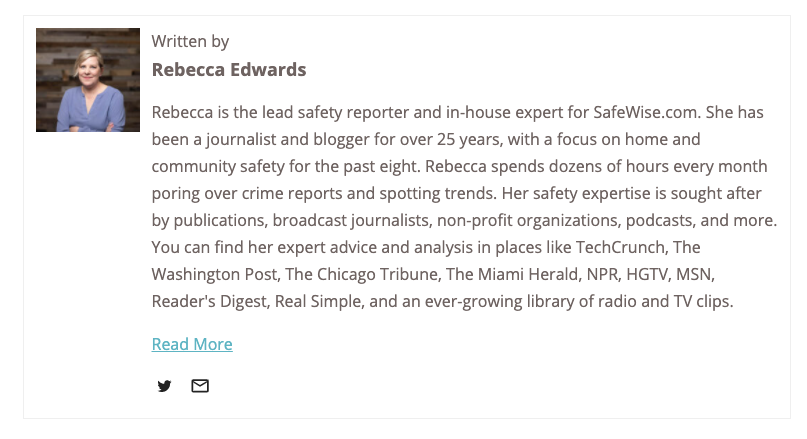
This bio comes from her article about the best home security systems. Isn't that totally something she would write?
Authoritative: Show why you're an expert
The most important part of a bio is showing your credibility.
Many of us—myself included—worry we'll write a bio that comes across as bragging. But there are ways to show your expertise without arrogance.
First, write in the third person: "he is" instead of "I am." In the book Yes!: 50 Scientifically Proven Ways to Be Persuasive, co-author and persuasion expert Robert Cialdini explains that others' introductions are more credible than our own. (That's why public speakers always have someone else introduce them.) The third person is a simple way to let "someone else" introduce you.
I recommend focusing on achievements, not titles, degrees, or years of experience. And when possible, use concrete facts instead of vague terms like "expert," "entrepreneur," or "industry leader."
One way to do this is to show the results you've gotten for customers, putting the spotlight on them, while subtly pointing out your expertise.
Yaw Aning does this well, mentioning how he's helped business owners drive millions in revenue.
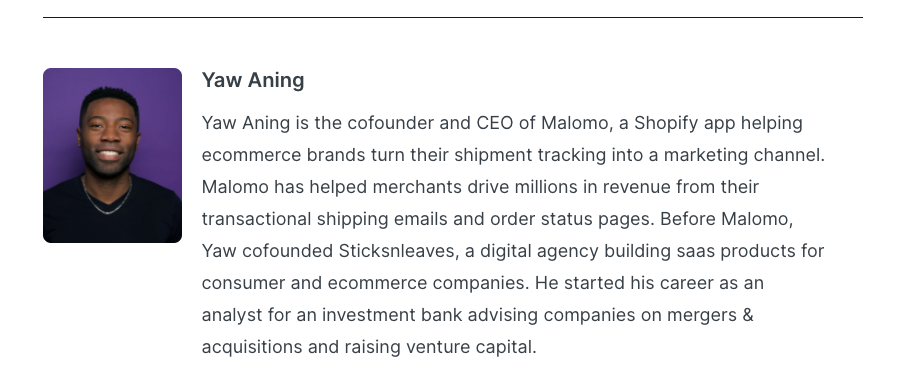
So, which accomplishments should you mention? Look for results that are relevant, fact-based, and have a high barrier to entry. A 10-minute speaking engagement at Google might mean more to your audience than 10 years in the tech industry. Authoring a groundbreaking research paper could mean more than your alma mater.
For example, few people would show their expertise with a Reddit account. But Patrick Stox does precisely that:

Patrick knows his target audience respects the fact he moderates a community of over 11,000 users.
Finally, it's usually better to focus on subject matter expertise rather than emphasizing your credentials as a writer. "Abir is a freelance writer and journalist who writes about the Middle East" will never sound as credible as "Abir has testified before U.S. Congress on Middle East policy."
Approachable: Let us see who you really are
We all want to show we're friendly. And the most common way to do this in a bio is to string together various hobbies in the final sentence. I'm sure you've seen bios like this before:
"Jess has been a freelance writer for four years. When they're not writing, you can find them hiking, drinking coffee, or binge-watching The Office. Follow them on Twitter."
But there's a better way to be approachable than mentioning unrelated interests—two ways, in fact.
The first is to go all-in on an unexpected skill or interest outside your work. For example, Gaetano DiNardi shows he's a skilled marketer and an accomplished music producer and songwriter:
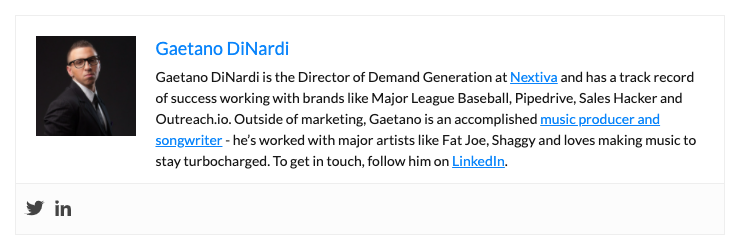
(He also does a great job mentioning brands with a high barrier to entry.)
But what if you don't want to focus just on interests outside of work? Then I recommend the second path: share how you use your work expertise in your personal life.
Home improvement writers Doug Mahoney and Harry Sawyers at The Wirecutter do a great job of this:
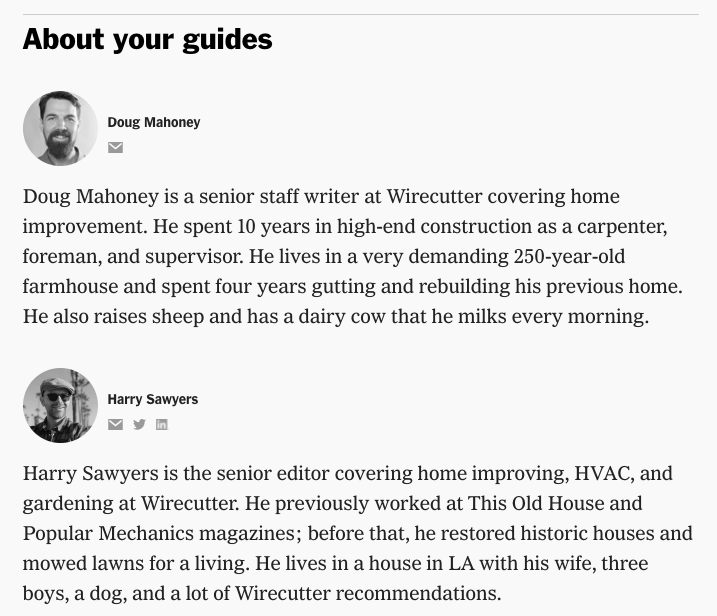
Doug cares for his farmhouse and spent years rebuilding his previous home. Harry has a house filled with Wirecutter recommendations. Both are interesting details from their lives that also bolster their credibility.
Samantha Renée's bio does a great job at this, too. Not only does she write for Shopify, but she also runs her own store and helps other stores grow:
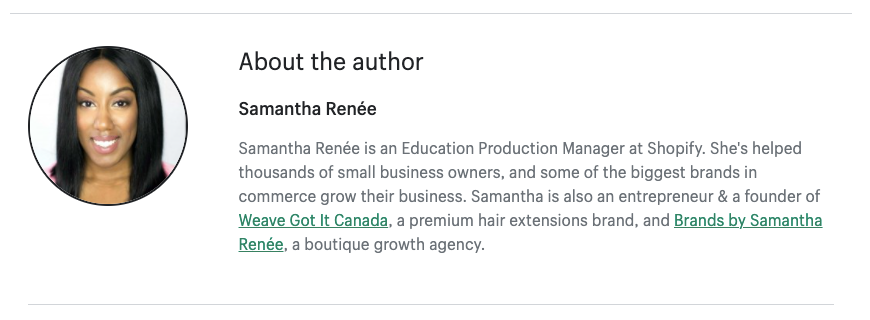
eCommerce is more than just a job for her. It's her passion as well, and it makes us trust her ideas all the more.
Showing your personal interest also helps the reader see similarities between you and them—a key factor for likeability. Someone reading the Shopify blog probably has a store of their own, like Samantha. Someone researching air conditioners is also looking to improve their home, just like Doug.
And by being approachable, we make it easier for people to approach us—through our call to action. The call to action is how we'll wrap up the bio, with a single next step for the reader to take. Choose just one CTA, and tie it into the subject matter of the article if possible. (If you can't include a link in your bio, you can wrap up with an elevator pitch for what you do.)
Think carefully about what the link text should say, and add a bit of mystery to encourage the reader to take action.
I love the link text in Benny Lewis's bio:

That's a link I'm curious to click on. (And I did.)
Basic bio templates
To summarize, a good bio is:
Authentic
Starts with a strong opening sentence
Shows why you care
Owns the ideas you've shared
Authoritative
Mentions meaningful, relevant accomplishments
Highlights areas with high barriers to entry
Focuses on expertise relevant to the article
Approachable
Highlights an unexpected skill (or)
Shows how you apply work expertise outside of your job
Concludes with a single, intriguing call to action
Here's a basic blog author bio template you can use.
[Name] helps [reader achieve benefit] at [organization]. They've [accomplished subject matter achievements]. Outside of work, they [apply expertise]. [Interesting CTA].
A final strategy to make your bio stand out
There's another step that happens as soon as you draft your perfect bio. You need to test it.
Run it by colleagues or potential clients. Test different versions on different articles, and track what generates the best results for you. But most importantly, put yourself in your reader's mindset and ask what would catch your eye.
There are always new experiments, methods, and strategies you can use to improve your bio. Whatever you do, don't let that paragraph after your article go to waste.
This was a guest post from Stephen Roe, founder of Grow Atom, who helps startups get results from content marketing. He's created content for Fortune 500 brands like Salesforce and AT&T, but likes working with startups best. At Grow Atom, results come first. Want to see your work on the Zapier blog? Read our guidelines, and get in touch.





